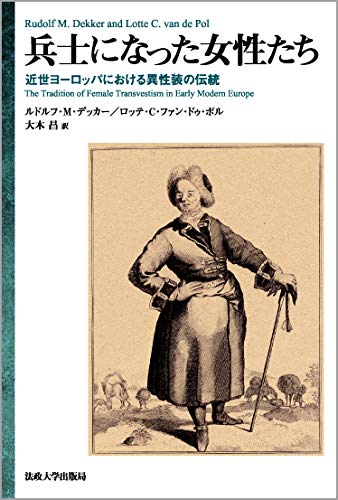13 0 0 0 兵士になった女性たち : 近世ヨーロッパにおける異性装の伝統
- 著者
- ルドルフ・M・デッカー ロッテ・C・ファン・ドゥ・ポル [著] 大木昌訳
- 出版者
- 法政大学出版局
- 巻号頁・発行日
- 2007
11 0 0 0 IR フォーラム 異性装をとおして見た近世ヨーロッパの民衆生活とジェンダー
- 著者
- 大木 昌
- 出版者
- 明治学院大学国際学部付属研究所
- 雑誌
- 研究所年報 (ISSN:13443976)
- 巻号頁・発行日
- no.11, pp.95-97, 2008-12
研究会 : フォーラム
5 0 0 0 OA 近代化と「山の文化」の変容―マタギ文化の歴史的検討を通して―
- 著者
- 大木 昌 OKI Akira
- 出版者
- 明治学院大学国際学部付属研究所
- 雑誌
- 明治学院大学国際学部付属研究所研究所年報 = Annual report of the Institute for International Studies (ISSN:13443976)
- 巻号頁・発行日
- vol.15, pp.10-46, 2012-12-01
5 0 0 0 IR 病と癒しの歴史 : もうひとつのインドネシア史研究を目指して
- 著者
- 大木 昌
- 出版者
- 京都大学
- 雑誌
- 東南アジア研究 (ISSN:05638682)
- 巻号頁・発行日
- vol.34, no.2, pp.339-369, 1996-09
この論文は国立情報学研究所の学術雑誌公開支援事業により電子化されました。This is an attempt to call attention to the history of disease and healing (or, simply, medical history) as an alternative approach to Indonesian history. Though this aspect of history has been studied very little, it is important and useful for the better understanding of history from broader perspectives. To begin with, disease (implicitly including death) and healing may have been the primary concern of the majority of people. Thus, it may be important to know what diseases people suffered from, how diseases were perceived, and what kinds of healing methods were applied at specific historical times. These issues are relevant to many other aspects, such as living conditions, the natural environment, demographic structure, and so forth. On the other hand, change in the healing system may occur with the introduction of a new religion and the acceptance of new medicine (e. g., Islamic and Western medicines). In political and economic history, the health and the size of the population were decisive factors of economic force and state power. Economic development might improve health conditions through improved nutrition, but the increase of population density and the development of transportation provided favorable conditions for the spread of diseases. Keeping these perspectives in mind, we will first see what kinds of diseases were prevalent in Indonesia, particularly Java and Sumatra. In describing this, I will try to relate certain diseases to social and economic conditions of the time concerned. Next, I will describe healing practice. Finally I will examine the use of herbal medicines in Java in the 1870s and around the beginning of the twentieth century.
2 0 0 0 OA 異性装をとおして見る近世ヨーロッパの社会史
- 著者
- 大木 昌 OKI Akira
- 出版者
- 明治学院大学国際学研究
- 雑誌
- 明治学院大学国際学研究 = Meiji Gakuin review International & regional studies (ISSN:0918984X)
- 巻号頁・発行日
- no.32, pp.55-68, 2007-12
2 0 0 0 OA 流域文化圏形成の史的考察―文献調査とフィールド調査から―
- 著者
- 大木 昌
- 出版者
- 明治学院大学国際学部
- 雑誌
- 明治学院大学国際学研究 = Meiji Gakuin review International & regional studies (ISSN:0918984X)
- 巻号頁・発行日
- vol.45, pp.55-64, 2014-03-31
【研究ノート/Research Note】
2 0 0 0 開発言説と公衆衛生:スリランカ,インド,インドネシアの事例研究
本研究の目的は、アジア諸社会において行われてきた公衆衛生に関わる社会開発の客観的・実態的把握に加え、政治的、社会文化的に構成され演出されてきた「清潔さ」「衛生」「健康」の関する語りやイメージを把握し、人々の社会開発をめぐる生活世界を解明することであった。そして、複数の社会での比較研究を通して、「開発現象」の共通性と個別性を明らかにすることを目指した。具体的には、(1)スリランカ、インド、インドネシアにおける公衆衛生プロジェクトの事例研究と、それに付随する様々な「開発現象」の学際的資料の収集、(2)開発言説を軸にした公衆衛生をめぐる新しい開発研究における枠組みの構築の2点であった。その結果、この3年間収集してきた資料は保健衛生に関わる開発プロジェクト、特に村落給水計画事業に関わるものであった。また、それと相前後して、調査のとりまとめに向けた理論的枠組みの再検討(アクター・ネットワーク論、サバルタン研究論)と、このような医療衛生研究の背景となる社会史的な資料の検討も行った。また、オランダに所蔵してあるインドネシアの医療史関係の資料も収集し分析した。ただし、とりまとめの研究成果報告書には、時間の関係で、村落給水事業の分析を十分に行うことは出来なかった。今後、村落給水計画に関する資料の整理を行い、開発言説と公衆衛生との関わりを論じていきたい。
1 0 0 0 OA 流域文化圏形成の研究(最終報告)
- 著者
- 竹尾 茂樹 大木 昌 齋藤 百合子
- 出版者
- 明治学院大学国際学部付属研究所
- 雑誌
- 明治学院大学国際学部付属研究所研究所年報 = Annual report of the Institute for International Studies (ISSN:13443976)
- 巻号頁・発行日
- vol.18, pp.3-26, 2015-12-01
【共同研究/Joint Research】
- 著者
- 大木 昌 OKI Akira
- 出版者
- 明治学院大学国際学部付属研究所
- 雑誌
- 研究所年報 (ISSN:13443976)
- 巻号頁・発行日
- no.15, pp.10-46, 2012-12
- 著者
- 雫石 未知 大木 昌稔 古橋 幹也
- 出版者
- 国家公務員共済組合連合会共済医学会
- 雑誌
- 共済医報 (ISSN:04547586)
- 巻号頁・発行日
- vol.58, no.2, pp.142-145, 2009-05
- 著者
- 大木 昌二 花見 恭太 堀内 文男 武田 敏 岩崎 秀昭 高見澤 裕吉 椎名 義雄 飯島 淳子
- 出版者
- 特定非営利活動法人日本臨床細胞学会
- 雑誌
- 日本臨床細胞学会雑誌 (ISSN:03871193)
- 巻号頁・発行日
- vol.30, no.5, 1991-09-21
1 0 0 0 OA 子宮頸部病変におけるHPV-DNAの局在と組織学的所見
- 著者
- 堀内 文男 大木 昌二 武田 敏 米満 博 計良 恵治 白沢 浩 富田 善身 清水 文七 岩崎 秀昭 高見沢 裕吉
- 出版者
- 特定非営利活動法人日本臨床細胞学会
- 雑誌
- 日本臨床細胞学会雑誌 (ISSN:03871193)
- 巻号頁・発行日
- vol.31, no.3, pp.444-449, 1992-05
- 被引用文献数
- 1


